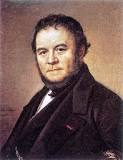The Red and the Black Page #14
Le Rouge et le Noir is a historical psychological novel in two volumes by Stendhal, published in 1830. It chronicles the attempts of a provincial young man to rise socially beyond his modest upbringing through a combination of talent, hard work, deception, and hypocrisy.
Many a princess who has become a bye-word for pride has given infinitely more attention to what her courtiers have been doing around her than did this apparently gentle and demure woman to anything which her husband either said or did. Up to the time of Julien's arrival she had never really troubled about anything except her children. Their little maladies, their troubles, their little joys, occupied all the sensibility of that soul, who, during her whole life, had adored no one but God, when she had been at the Sacred Heart of Besançon. A feverish attack of one of her sons would affect her almost as deeply as if the child had died, though she would not deign to confide in anyone. A burst of coarse laughter, a shrug of the shoulders, accompanied by some platitude on the folly of women, had been the only welcome her husband had vouchsafed to those confidences about her troubles, which the need of unburdening herself had induced her to make during the first years of their marriage. Jokes of this kind, and above all, when they were directed at her children's ailments, were exquisite torture to Madame de Rênal. And these jokes were all she found to take the place of those exaggerated sugary flatteries with which she had been regaled at the Jesuit Convent where she had passed her youth. Her education had been given her by suffering. Too proud even to talk to her friend, Madame Derville, about troubles of this kind, she imagined that all men were like her husband, M. Valenod, and the sub-prefect, M. Charcot de Maugiron. Coarseness, and the most brutal callousness to everything except financial gain, precedence, or orders, together with blind hate of every argument to which they objected, seemed to her as natural to the male sex as wearing boots and felt hats. After many years, Madame de Rênal had still failed to acclimatize herself to those monied people in whose society she had to live. Hence the success of the little peasant Julien. She found in the sympathy of this proud and noble soul a sweet enjoyment which had all the glamour and fascination of novelty. Madame de Rênal soon forgave him that extreme ignorance, which constituted but an additional charm, and the roughness of his manner which she succeeded in correcting. She thought that he was worth listening to, even when the conversation turned on the most ordinary events, even in fact when it was only a question of a poor dog which had been crushed as he crossed the street by a peasant's cart going at a trot. The sight of the dog's pain made her husband indulge in his coarse laugh, while she noticed Julien frown, with his fine black eyebrows which were so beautifully arched. Little by little, it seemed to her that generosity, nobility of soul and humanity were to be found in nobody else except this young abbé. She felt for him all the sympathy and even all the admiration which those virtues excite in well-born souls. If the scene had been Paris, Julien's position towards Madame de Rênal would have been soon simplified. But at Paris, love is a creature of novels. The young tutor and his timid mistress would soon have found the elucidation of their position in three or four novels, and even in the couplets of the Gymnase Theatre. The novels which have traced out for them the part they would play, and showed them the model which they were to imitate, and Julien would sooner or later have been forced by his vanity to follow that model, even though it had given him no pleasure and had perhaps actually gone against the grain. If the scene had been laid in a small town in Aveyron or the Pyrenees, the slightest episode would have been rendered crucial by the fiery condition of the atmosphere. But under our more gloomy skies, a poor young man who is only ambitious because his natural refinement makes him feel the necessity of some of those joys which only money can give, can see every day a woman of thirty who is sincerely virtuous, is absorbed in her children, and never goes to novels for her examples of conduct. Everything goes slowly, everything happens gradually, in the provinces where there is far more naturalness. Madame de Rênal was often overcome to the point of tears when she thought of the young tutor's poverty. Julien surprised her one day actually crying. "Oh Madame! has any misfortune happened to you?" "No, my friend," she answered, "call the children, let us go for a walk." She took his arm and leant on it in a manner that struck Julien as singular. It was the first time she had called Julien "My friend." Towards the end of the walk, Julien noticed that she was blushing violently. She slackened her pace. "You have no doubt heard," she said, without looking at him, "that I am the only heiress of a very rich aunt who lives at Besançon. She loads me with presents.... My sons are getting on so wonderfully that I should like to ask you to accept a small present as a token of my gratitude. It is only a matter of a few louis to enable you to get some linen. But--" she added, blushing still more, and she left off speaking-- "But what, Madame?" said Julien. "It is unnecessary," she went on lowering her head, "to mention this to my husband." "I may not be big, Madame, but I am not mean," answered Julien, stopping, and drawing himself up to his full height, with his eyes shining with rage, "and this is what you have not realised sufficiently. I should be lower than a menial if I were to put myself in the position of concealing from M de. Rênal anything at all having to do with my money." Madame de Rênal was thunderstruck. "The Mayor," went on Julien, "has given me on five occasions sums of thirty-six francs since I have been living in his house. I am ready to show any account-book to M. de Rênal and anyone else, even to M. Valenod who hates me." As the result of this outburst, Madame de Rênal remained pale and nervous, and the walk ended without either one or the other finding any pretext for renewing the conversation. Julien's proud heart had found it more and more impossible to love Madame de Rênal.
Translation
Translate and read this book in other languages:
Select another language:
- - Select -
- 简体中文 (Chinese - Simplified)
- 繁體中文 (Chinese - Traditional)
- Español (Spanish)
- Esperanto (Esperanto)
- 日本語 (Japanese)
- Português (Portuguese)
- Deutsch (German)
- العربية (Arabic)
- Français (French)
- Русский (Russian)
- ಕನ್ನಡ (Kannada)
- 한국어 (Korean)
- עברית (Hebrew)
- Gaeilge (Irish)
- Українська (Ukrainian)
- اردو (Urdu)
- Magyar (Hungarian)
- मानक हिन्दी (Hindi)
- Indonesia (Indonesian)
- Italiano (Italian)
- தமிழ் (Tamil)
- Türkçe (Turkish)
- తెలుగు (Telugu)
- ภาษาไทย (Thai)
- Tiếng Việt (Vietnamese)
- Čeština (Czech)
- Polski (Polish)
- Bahasa Indonesia (Indonesian)
- Românește (Romanian)
- Nederlands (Dutch)
- Ελληνικά (Greek)
- Latinum (Latin)
- Svenska (Swedish)
- Dansk (Danish)
- Suomi (Finnish)
- فارسی (Persian)
- ייִדיש (Yiddish)
- հայերեն (Armenian)
- Norsk (Norwegian)
- English (English)
Citation
Use the citation below to add this book to your bibliography:
Style:MLAChicagoAPA
"The Red and the Black Books." Literature.com. STANDS4 LLC, 2025. Web. 10 Mar. 2025. <https://www.literature.com/book/the_red_and_the_black_201>.








Discuss this The Red and the Black book with the community:
Report Comment
We're doing our best to make sure our content is useful, accurate and safe.
If by any chance you spot an inappropriate comment while navigating through our website please use this form to let us know, and we'll take care of it shortly.
Attachment
You need to be logged in to favorite.
Log In